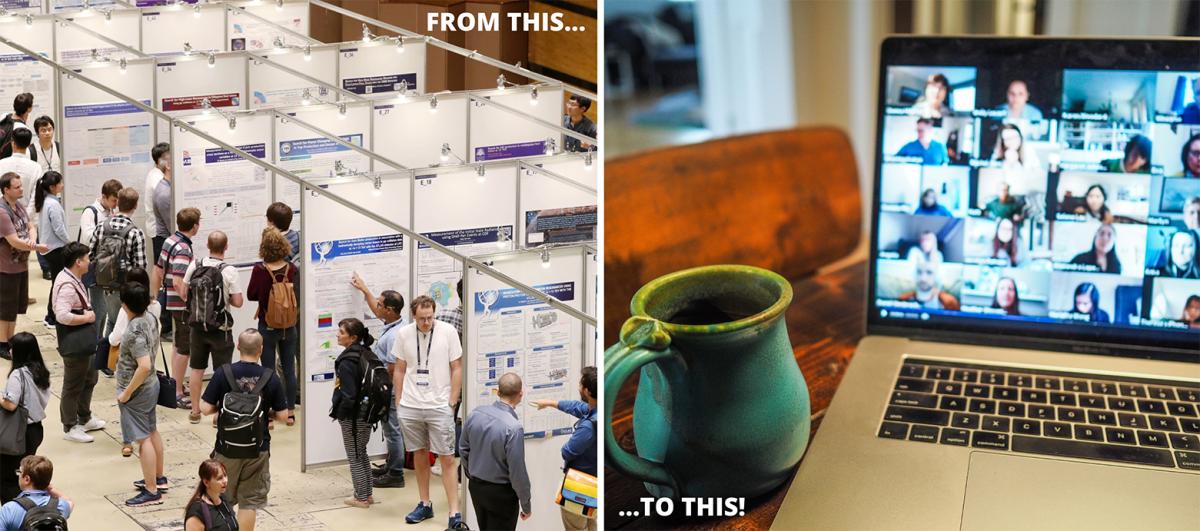You want me to present a poster…. remotely?
22 June 2020 | By

The Large Hadron Collider Physics conference held its first virtual edition last month. While attending virtual talks is commonplace in particle physics, for the first time attendees also participated in virtual poster sessions.
Though an academic affair, poster sessions are also an opportunity to network and socialise with colleagues. Typically, a large hall will be filled with rows of poster stands, their authors standing anxiously beside them, anticipating whatever question may be posed by a passer-by. Finger food and drinks are usually served. Sometimes these encounters lead to in-depth discussions about a new result but, more often than not, they just serve as ice-breakers for would-be colleagues, or a kind of “physics buffet” for conference attendees to sample subjects outside their specialization. Could such an experience be recreated in an online conference?
For LHCP2020, participants were instead asked to provide 3-minute video presentations of their poster. They then participated in an open Zoom connection, where colleagues could connect and ask questions about their work. Members of the ATLAS Collaboration share their experience taking part, as well as their overall impressions of the conference.

Ana Luísa Carvalho, LIP
"Attending LHCP was a great opportunity, but of course it went a bit differently than what I originally envisioned. I had imagined myself in Paris but ended up attending from my desk. Nonetheless, I think everything worked wonderfully well and it was a truly remarkable achievement to hold such a huge conference entirely online. Weirdly enough, there were some upsides to it. Attending from home means that the distractions associated with being in a room filled with people are gone, allowing you to focus solely on the talks.
For the poster presentation, I was able to comfortably wait in my Zoom meeting room instead of having to awkwardly stand next to my poster waiting for someone to approach me. We were also encouraged to record a small video explaining the poster, which is a great way of publicising our work and making it widely accessible even after the conference is over. Hopefully this crazy experience will lead to more conferences being held partially remotely, making them accessible to a wider audience."

Meirin Oan Evans, University of Sussex
"This was my first virtual conference, and in particular the first virtual poster session! I did find that fewer people beamed into my poster ‘Zoom room’ than the number of people that would usually stop for a quick chat about my poster during an in-person poster session. That reminded me how important it is to have a catchy title!
However, I found that the chats I did have were higher quality than the average chat during an in-person poster session. Virtually, it was even easier to follow-up with an interested poster inspector. All that had to be done was type an email address into the Zoom chat and an exchange could be started!"
"Hopefully this crazy experience will lead to more conferences being held partially remotely, making them accessible to a wider audience."

Silvia Franchino, Heidelberg University
"Though I could attend only a few talks of the conference, I did present a poster during the virtual session. The idea of the video presentation was nice, as was the idea of having all posters loaded in Indico. However, I found the two hours allocated to answer questions to be a bit of lost time, since nobody did actually connect to ask questions."

Ana Peixoto, LIP
"LHCP2020 was not only my first LHCP, but also my first online conference. The more compact programme (in order to include people from all over the world) allowed me to follow the subjects that I am more interested in in more detail. Perhaps, with a more spread out timetable, I would have also been able to listen to other not so familiar topics. My contribution to the conference was done through a poster, which was where the difference between an online and in-person poster session was more noticeable.
The 3-minute video explanation and the meeting room for each poster were good supplements with a reasonable participation, even if not as extensive as previous LHCP conferences (and that is understandable!). Personally, I found the outcome positive, with the traditional programme discussing a wide range of particle-physics topics and several key results being presented for the first time. In summary, I was very happy to participate and learn through this important conference taking into account that, had it not been organised online, the probability of my attendance would have been highly reduced."




